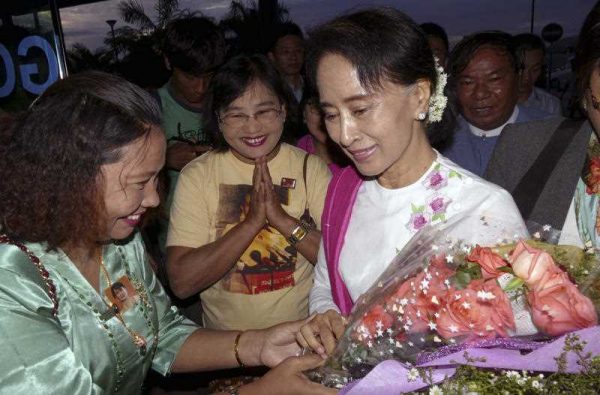The invitation shows that Chinese policy on Myanmar has become more pragmatic and flexible. Myanmar is strategically located — it connects Southeast Asia to South Asia. China wants to implement the One Belt, One Road and the Bangladesh–China–India–Myanmar Economic Corridor initiatives, and to maintain the China–Myanmar oil and gas pipeline and other energy projects. It is critical that China secures Myanmar’s political stability, economic development and social progress.
Suu Kyi’s visit will bring China three benefits. First, it demonstrates to the world that China has the mind and ambition of a major power, and is determined to continue opening up. For many years, some Western countries have criticised China for associating with ‘failed states’ that struggle to integrate into the international community. But by inviting Suu Kyi to China, China has shown its foreign policy has become more confident and open.
Second, the visit will better protect Chinese interests in Myanmar. Strengthening contacts with the NLD will further encourage the establishment of mutual trust between the CCP and the NLD. This will help protect Chinese interests.
Third, the visit will improve China’s competitiveness in Myanmar. In recent years, the United States, Japan and India have been accelerating their position in Myanmar. The United States has been trying to use Myanmar as a ‘wedge’ to contain China, while Japan has been providing financial assistance to Myanmar in a possible attempt to limit China’s energy expansion to the south. India began improving relations with Myanmar following China’s improved relations with the country. The visit confirms China’s position as a strong but peaceful party in Myanmar relations. And as Suu Kyi is renowned among the people of Myanmar and the world, China improves its position globally by making contact with her party.
Suu Kyi’s trip also showed Myanmar’s pragmatic and multi-dimensional policy towards China. The 70-year-old Nobel laureate leader of the NLD is a prestigious political figure. Since 1988, she has been advocating a non-violent way to promote democratic reforms in Myanmar, and is one of the most popular presidential candidates for the country’s general election at the end of 2015. As a strong opponent of Myanmar’s military junta, Suu Kyi stance toward China was once tough. But in recent years, she has appeared willing repair and develop relations with China. Suu Kyi wants to use China to constrain the current Myanmar government’s attempts to interfere in the upcoming election. Suu Kyi is predicted to win the general election. But she is actually barred from running for president — the Burmese parliament has failed to remove the army’s veto over constitutional change.
While the ruling Solidarity and Development Party (SDP) has been actively promoting political reconciliation with the NLD, it has taken legal means to obstruct Suu Kyi’s efforts to run for presidency. It has created turmoil in northern Myanmar, which has constrained the NLD. Suu Kyi may be looking abroad for help with promoting a constitutional amendment and holding normal elections as scheduled.
The closer ties between the CCP and the NLD will certainly bolster Suu Kyi’s campaign. The longstanding Sino–Burmese ‘Pauk-Phaw friendship’ is deeply rooted in the people of the two countries, both politically and socially. Suu Kyi has to conform to this trend if she or her party intends to win the election. The NLD leader had never visited Myanmar’s largest neighbour and had never established normal relations with China. Her visit to China can be regarded as a lesson in patching up previous oversights.
Regardless of the outcome of the upcoming general elections in Myanmar, any elected political party and their leader will most likely implement a China-friendly policy. China will continue to help Myanmar in promoting faster economic development. In the meantime, China should see Suu Kyi’s visit as an opportunity to deliver a positive signal for deeper exchanges and communication with Myanmar.
Dai Yonghong is professor at the Institute of South Asia Studies, Director of the Center for Myanmar Studies, Sichuan University, China and Non-Resident Senior Fellow at the Institute of Security and Development Policy, Sweden.
Wang Jianping is a research assistant at Center for Myanmar Studies, Institute of South Asia Studies, Sichuan University.


China, as the world’s largest nation and the second largest economy, should and must gradually learn to act as a skilful world leader. The visit by Aung San Suu Kyi at the invitation of the CCP reflects in a sense a significant move in that direction. This can also be viewed as a continuation China’s move in its relationship with both the South and North Koreas.
Irrespective of one party rule in China, multi party politics is a reality in many countries. China’s leadership needs to have constructive relationships with all major parties in other countries.